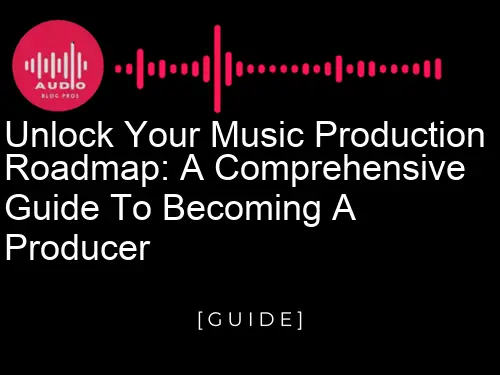Are you a musician who dreams of becoming a successful producer? Do you feel like you’re stuck in a never-ending cycle of trial and error? Well, if you’re looking for a clear roadmap to guide your musical journey, then look no further. In this blog post, we’ll provide a comprehensive guide to help you unlock your music production roadmap and become the producer of your dreams. So, if you want to take the first step on your journey to becoming a successful producer, read on!
Table of Contents
Get to Know the Basics of Music Production
In order to become a successful music producer, you’ll need to understand the basics of music production. This includes understanding how sound is created, how to use various music production tools, and how to mix and master tracks. If you’re new to the game, start by reading through this Music Production Roadmap guide. It will get you up to speed on the most essential concepts in the field. Once you’ve got a good foundation, continue learning by exploring different types of music production tutorials or courses that fit your interests and goals. As you gain more experience and knowledge, consider advancing your skills by taking certification exams or attending industry sponsored workshops. With enough hard work and dedication, becoming a successful music producer is totally possible!
Understand the Different Types of Music Production
There are a variety of different music production styles, and each one has its own set of tools and techniques that you need to learn in order to produce great sounding music. If you’re just starting out, it can be helpful to first understand the basics of music production before diving into more specific topics. In this section, we’ll cover the different types of music production and provide a brief overview of the tools and techniques that are typically used in each style.
When producing electronic music, you’ll typically use software like Ableton or Pro Tools to create and edit your tracks. These programs offer a wide range of features that allow you to create intricate tracks with ease. When producing acoustic music, you’ll likely use a guitar or other acoustic instrument to create your tracks. You’ll need to learn how to play the instrument properly in order to produce quality tracks.
Each type of music production has its own set of unique tools and techniques that you need to learn if you want to produce great sounding music. If you’re new to music production, it can be helpful to start with one specific type of production and work your way up from there. There’s no wrong way to approach music production, so feel free to experiment and explore different techniques until you find something that works best for you.

Choose the Right Tools for Your Music Production
When choosing the right tools for your music production, it is important to understand that not all software is created equal. There are a variety of different software programs available, each with its own strengths and weaknesses. Here are some of the most common types of music production software:
-
Recording Software: This type of software allows you to record audio and MIDI files directly onto your computer. Common recording programs include Ableton Live, FL Studio, Pro Tools, and Tracktion Record.
-
Mixing Software: This type of software lets you mix multiple tracks together into a single output file. Common mixing programs include Logic Pro, Digital Performer, and Cubase SE/5/6.
-
Audio Editing Software: This type of program allows you to edit audio files by cutting, pasting, changing volume levels, etc.. Common audio editing programs include Adobe Audition CC/CS6/7 and Avid ProTools 11/12 CFX Suite).
-
Mastering Software: This type of program helps to produce high-quality final mixes for your songs.Common mastering applications includes Bitwig Studio 2 (which also has a plugin suite), Izotope Ozone 6+, Music Production Suite from Sonarworks , FL Studio 12 Ultimate Edition , and MASCHINE 2 controller app .
Learn the Fundamentals of Mixing and Mastering
Mixing and Mastering:
A great way to improve the quality of your music is to mix and master it yourself. Mixing is the process of combining multiple tracks together to create a final product, while mastering takes this one step further by enhancing or tweaking the audio depending on your specific needs. There are many software programs available that make both tasks easy to accomplish, so feel free to try out a number of them until you find something that works best for you. When mixing, it’s important to keep in mind what each track is supposed to do in relation to the others; if one track sounds too loud or muddy compared to the others, adjusting the levels will help remedy this. Finally, be sure to check your mixes for any leaks or unexpected noises; fixing these before releasing your music can make a big difference in its sound quality.

Develop Your Own Unique Production Style
In this section, we will be discussing the basics of mixing and mastering. Mixing is the process of combining various audio tracks together to create a final, finished product. Mastering is the final step in the music production process, and it is responsible for improving the sound quality of your track(s). Remember that these are just basic guidelines; you should use your own discretion when it comes to these steps. However, following these tips will help you produce better sounding music overall.

Utilize Creative Strategies to Enhance Your Tracks
Experiment with Different Genres and Sounds
There are a variety of creative strategies you can use to enhance your tracks. One way is to experiment with different genres and sounds. By doing this, you’ll be able to create interesting textures and sonic landscapes that can add depth and complexity to your music. Additionally, you can use creative effects such as reverb and delay to give your tracks an extra layer of sound. This will help you create tunes that stand out from the crowd.
Incorporate Unique Samples and Loops
When producing your music, it’s important to experiment with different genres and sounds. By incorporating creative strategies into your tracks, you can enhance their quality and appeal. Here are a few tips for enhancing your songs:
- Use unconventional samples and loops: When exploring new sonic territory, try using unconventional samples and loops to add depth and interest to your tracks. For example, you could use sampled voices or organs to create something entirely new sounding. Alternatively, find interesting loop presets on audio software or websites to use in your tracks.
- Utilize dynamic effects: One of the most important aspects of good music production is dynamics – making sure each track has the right level of volume and intensity throughout its duration. Try using dynamic effects to achieve this, such as compressors or reverb.
- Use sonic textures: One of the main ways to add depth and interest to your tracks is by using sonic textures. This involves creating layers of sound that create a richer, more detailed listening experience. Try layering different sounds together in order to create complex textures.
- Use harmony and melody: Good music production always features harmony and melody – two essential elements of good songwriting. By incorporating both elements into your tracks, you can create melodies that are emotive and engaging, while also providing harmonic support for the vocals and other instruments.
Utilize Automation for Added Interest
Creativity is key when it comes to music production. If you want your tracks to stand out from the rest, you need to use creative strategies to enhance them. Some people rely on samples and loops; others utilizes automation to help get their production flowing. Utilize a variety of these techniques and see what helps produce the most interesting sounds for your beats.
Try Out Different Mixing Techniques
Mixing is one of the most important aspects of music production. It’s the process of combining multiple tracks together to create a final product. By experimenting with different mixing techniques, you can create interesting and unique sounds that will help your tracks stand out.
Try Different EQ Settings
One of the most common mixing techniques is to use EQ (equalization) to adjust the levels of different tracks. By adjusting the EQ on different tracks, you can create a variety of sounds and textures. Try using different frequencies to add depth or brightness to a track, or boost specific frequencies to create a punchy sound.
Use Compression for Added Punch
Compression is another common mixing technique that can add punch and energy to a track. By compressing a track, you can make it louder and more pronounced. This can help to create a more powerful sound.
Use Reverb for Added Depth
Reverb is another common mixing technique that can add depth and dimension to a track. By using reverb on different tracks, you can create a variety of sounds that are reminiscent of different environments. Try using different settings to create different atmospheres.
Use Delay for Added Ambience
Delay is another common mixing technique that can add depth and atmosphere to a track. By delaying a track, you can create a variety of sounds that are reminiscent of time passing. Try using different settings to create different effects.

Take Advantage of Technology to Streamline Your Workflow
One of the most important things you can do to ensure your music production roadmap is successful is to stay motivated and constantly learning new techniques. There are always new technologies and tools available that can help you streamline your workflows and make your music production dreams a reality. If you ever find yourself feeling lost or like you’re not progressing as quickly as you want, it’s important to remember that there are many resources available online that can guide and support your success. Additionally, joining industry groups and forums can give you access to other producers who may be able to offer some great advice or help guide you along the way. So don’t be afraid to ask for help – it might just be the jump start that gets you on the path to producing top-notch music!

Network and Connect with Other Producers
Join Music Production Communities
Producing music can be a solitary pursuit, but it’s also a great way to connect with other like-minded individuals. Joining music production communities can help you learn from others and get feedback on your work. Additionally, network with other producers and find collaborators who can help you take your music production to the next level.
Attend Music Production Events
Producers are always looking to network and connect with other producers. Here are a few ways to do that:
-
Join Music Production Communities. These groups can offer valuable feedback, help you find new collaborators, and support your music career in general. Finding a community that aligns with your specific interests is key, so be sure to research before signing up.
-
Attend Music Production Events. Not only will you have the opportunity to meet with like-minded producers and musicians, but you’ll also get an insight on what’s happening in the music production industry as a whole. This isn’t just limited to live events – many online resources also offer monthly newsletters full of tips and advice for burgeoning producers.
-
Use Online Resources. There are countless online resources that can help you learn more about music production. Whether you’re looking for tutorials, tips, or advice, these resources can be a valuable asset.
Producers are always looking to network and connect with other producers. Here are a few ways to do that:
-
Join Music Production Communities. These groups can offer valuable feedback, help you find new collaborators, and support your music career in general. Finding a community that aligns with your specific interests is key, so be sure to research before signing up.
-
Attend Music Production Events. Not only will you have the opportunity to meet with like-minded producers and musicians, but you’ll also get an insight on what’s happening in the music production industry as a whole. This isn’t just limited to live events – many online resources also offer monthly newsletters full of tips and advice for burgeoning producers.
-
Use Online Resources. There are countless online resources that can help you learn more about music production. Whether you’re looking for tutorials, tips, or advice, these resources can be a valuable asset.
Reach Out to Established Producers
Producing music can be a daunting task, but with the right resources and support, it can be a rewarding experience. One of the best ways to network and connect with other producers is to attend music production events. These events can offer you the opportunity to meet new producers, learn from seasoned professionals, and gain access to resources and equipment you may not be able to find on your own. Additionally, reaching out to established producers can help you get your music heard by the right people and gain valuable feedback.
Build Your Own Network of Producers
Building a network of music producers is one of the most important steps you can take in your music production career. Not only will this allow you to connect with more experienced producers, but it also allows you to tap into new and innovative ideas that may help improve your own music production skills. Here are a few tips for building a producer network:
- Start by reaching out to established producers who can give you advice and mentorship. They may be able to connect you with other producers in the industry, or offer suggestions on how to get started.
- Join professional societies and networking groups related to your field of music production. This will allow you to meet other professionals and exchange ideas and feedback.
- Talk to other musicians about their experiences working with producers. This will give you a better understanding of what it takes to produce a successful track.
- Search for producer resources online. This includes blogs, forums, and websites that focus on music production.
- Connect with other music producers through social media platforms. This is a great way to stay up-to-date on industry news and connect with other producers in your area of expertise.

Promote Your Music and Build an Audience
As a producer, your success depends on being able to market yourself and your music. There are many different ways to do this, but one of the most effective methods is by building an online presence. This can be done through social media platforms like Twitter and Facebook, as well as website hosting services like WordPress or Drupal. You can also create a blog and promote your music there, or make use of various music marketing tools available online. Creating a strong online presence will not only help you reach new listeners, but it will also help you build rapport with established artists and industry professionals.

Stay Motivated and Keep Learning
After producing your first few tracks, you’ll likely start to develop a unique production style. While there is no ‘right’ way to produce music, following some basic guidelines will help you produce tracks that sound more professional and cohesive. Additionally, using technology to streamline your workflow can give you the edge you need to compete with the best producers in the business. Finally, maintaining motivation and learning new techniques is essential if you want to keep progressing as a producer.
Producing music is one of the most rewarding and enjoyable creative activities you can do. With dedication and a good roadmap, you can unlock your hidden producer potential. Now that you have a comprehensive overview of starting out on your journey to becoming an artist, check out our other articles for content related to mastering production techniques, finding inspiration from others in the industry, and growing as an independent artist. Let’s go create something amazing!


